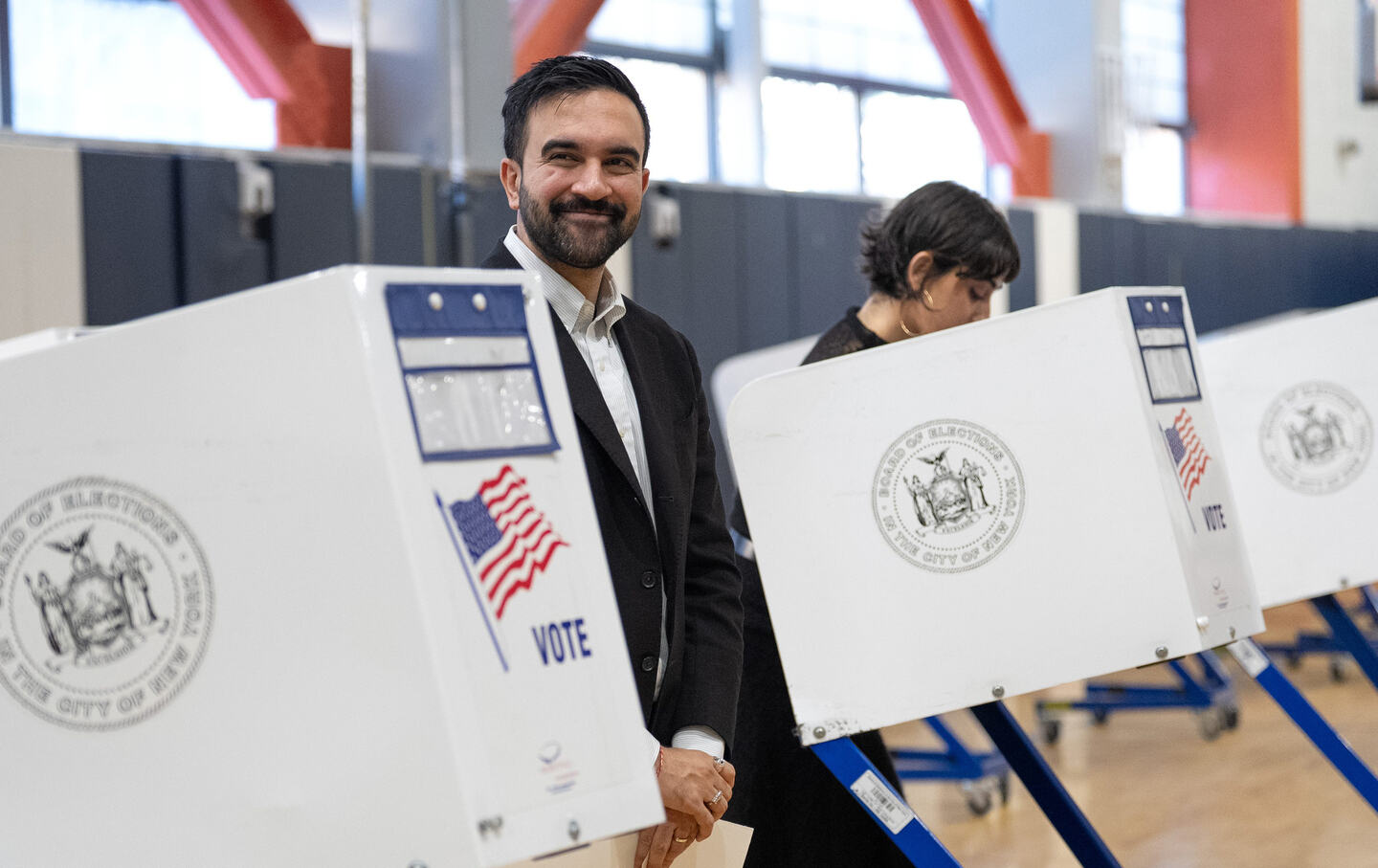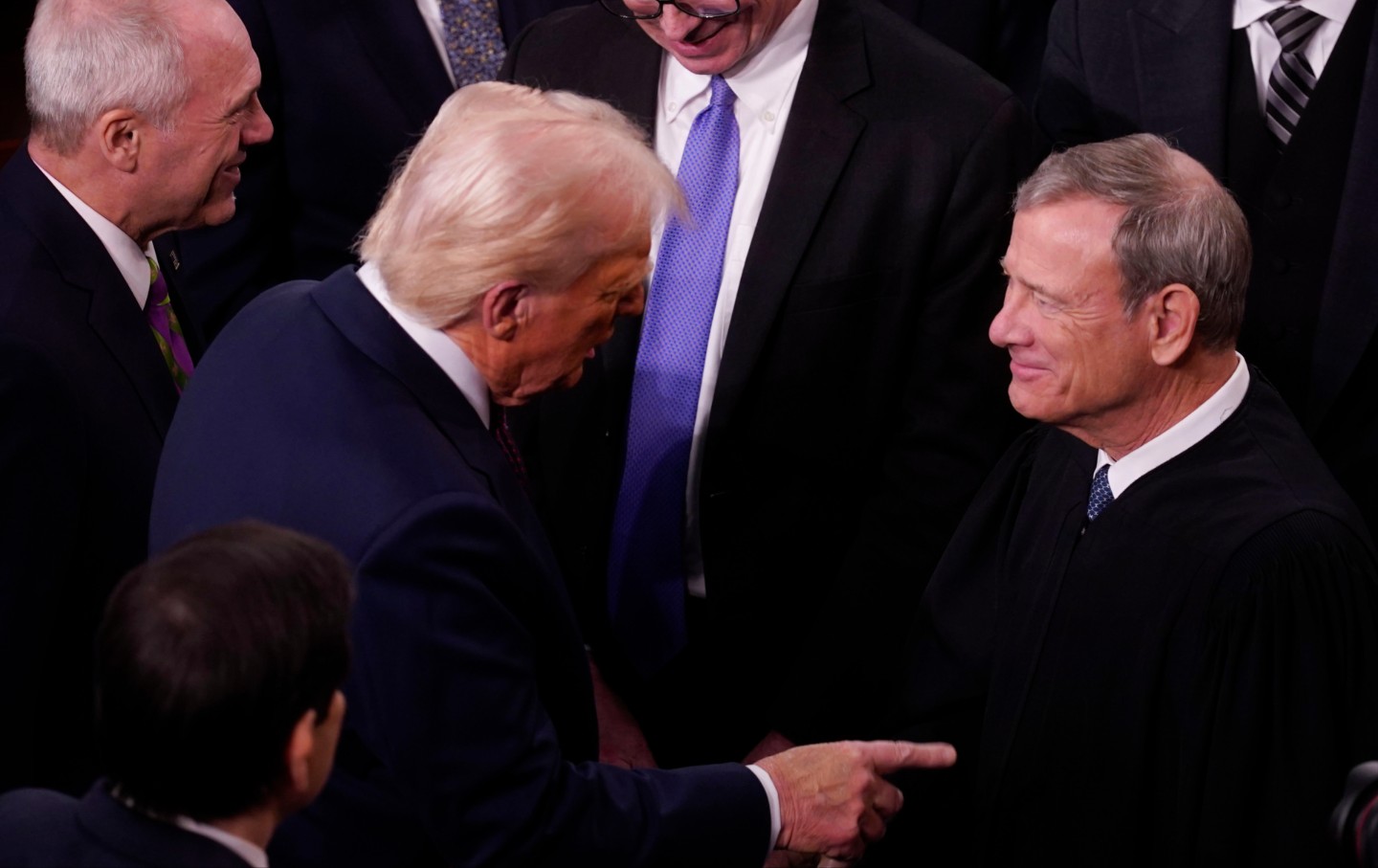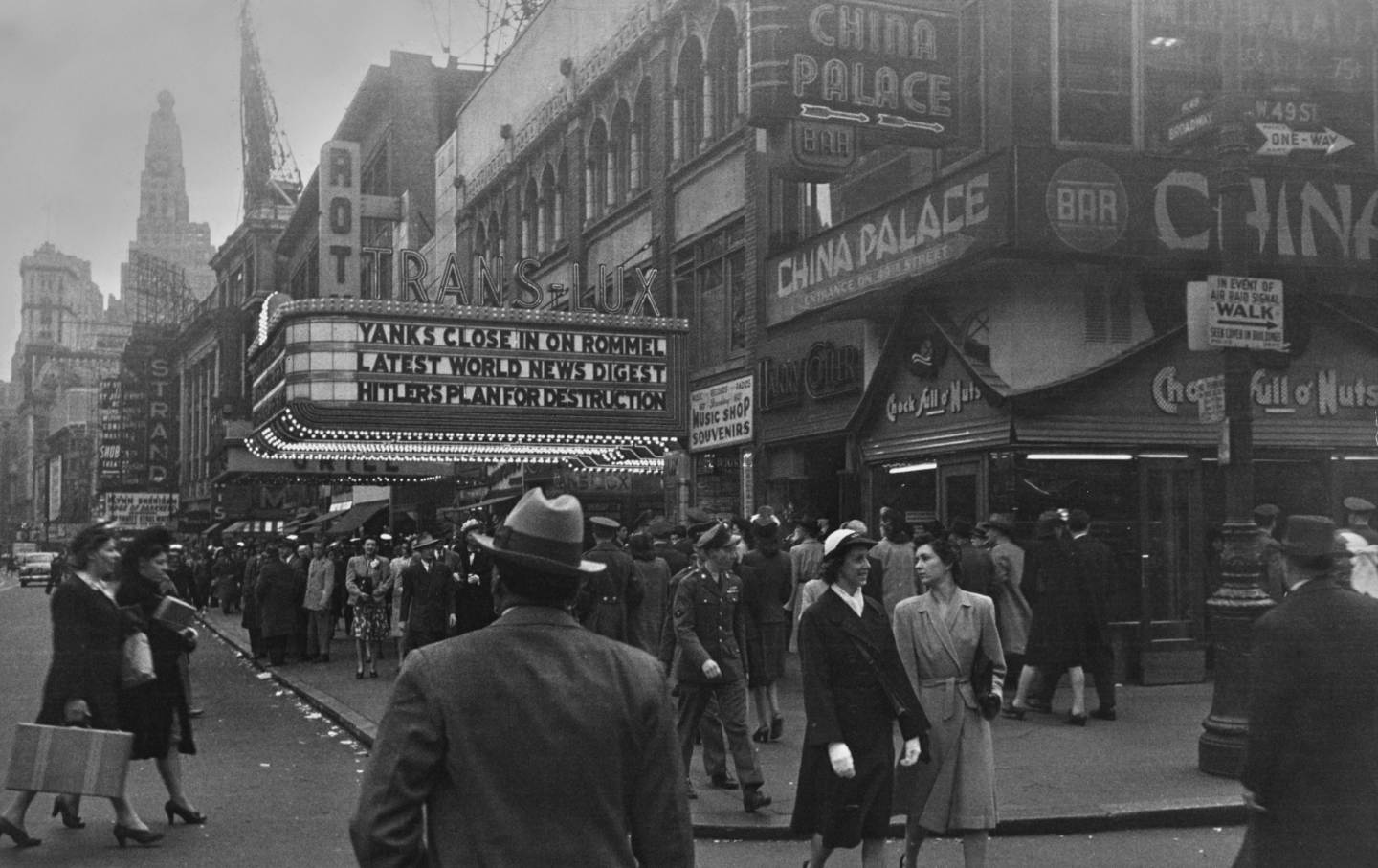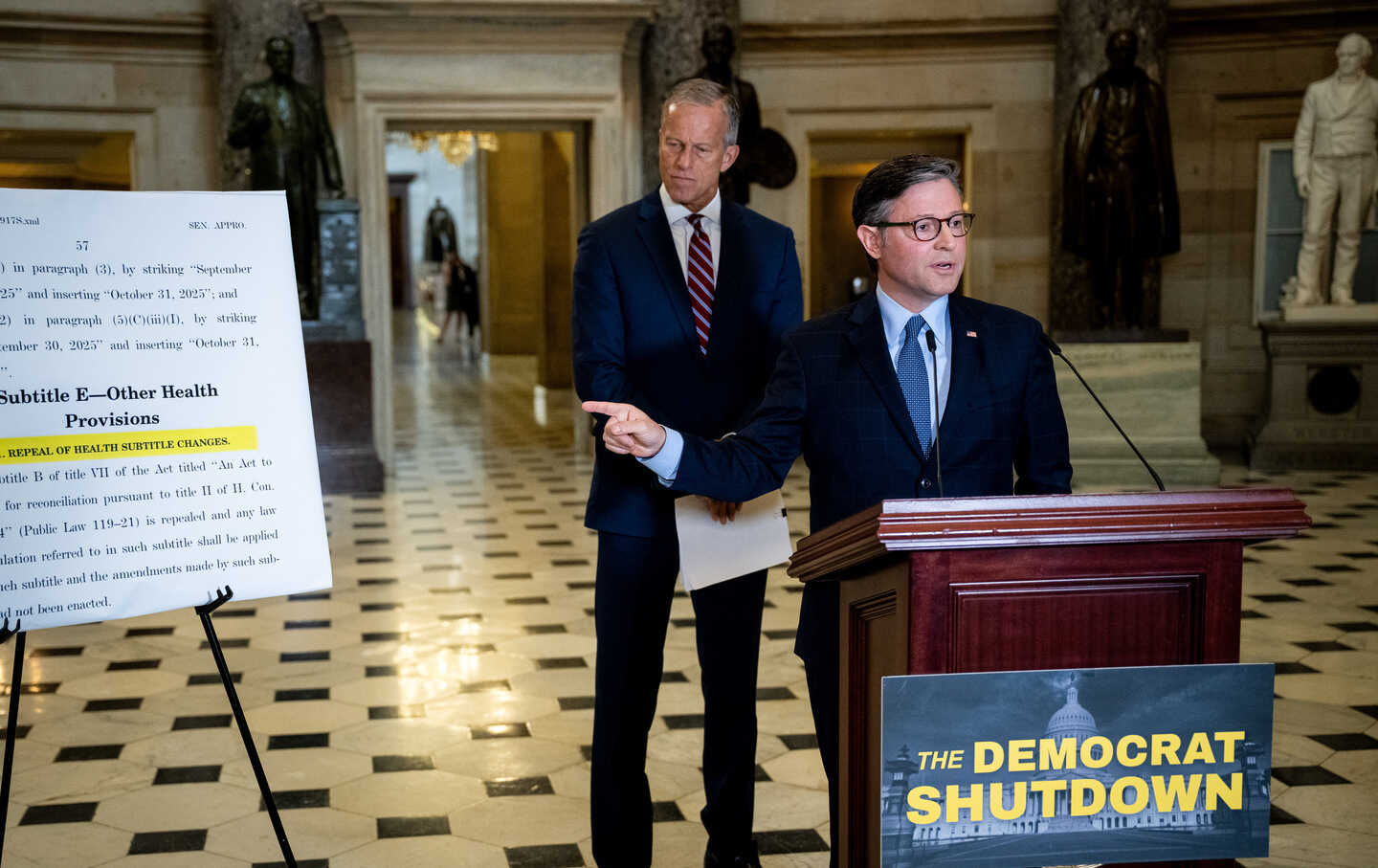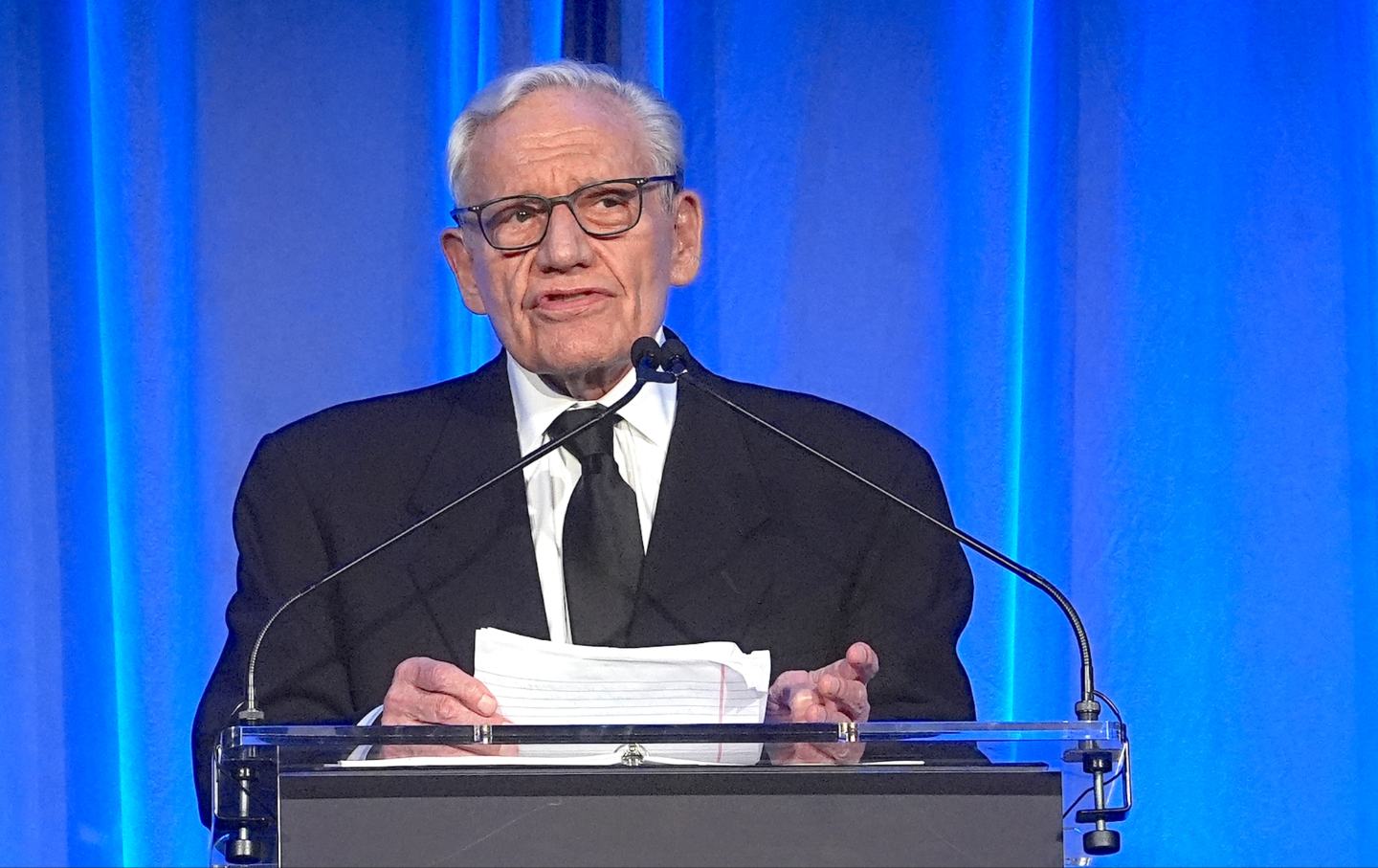How Kamala Can Win, and Homeless Vets Sue the VA
On this episode of Start Making Sense, Steve Phillips analyzes changes in the electorate and Mark Rosenbaum talks about the class action suit in LA.

Here's where to find podcasts from The Nation. Political talk without the boring parts, featuring the writers, activists and artists who shape the news, from a progressive perspective.
Kamala Harris is likely to be the next president of the United States—that’s what Steve Phillips says. He's on this episode of Start Making Sense analyzing changes in the electorate and suggests what the Democrats need to do to create majorities in the swing states.
Also on this episode: Los Angeles has 4,000 homeless vets, living on the streets. Now, a class action suit demanding the VA fulfill its pledge to provide housing for them is going to trial in federal court. The lead attorney for the homeless vets, Mark Rosenbaum, explains the arguments and the evidence.
Our Sponsors:
* Check out Avocado Green Mattress: https://avocadogreenmattress.com
Advertising Inquiries: https://redcircle.com/brands
Privacy & Opt-Out: https://redcircle.com/privacy
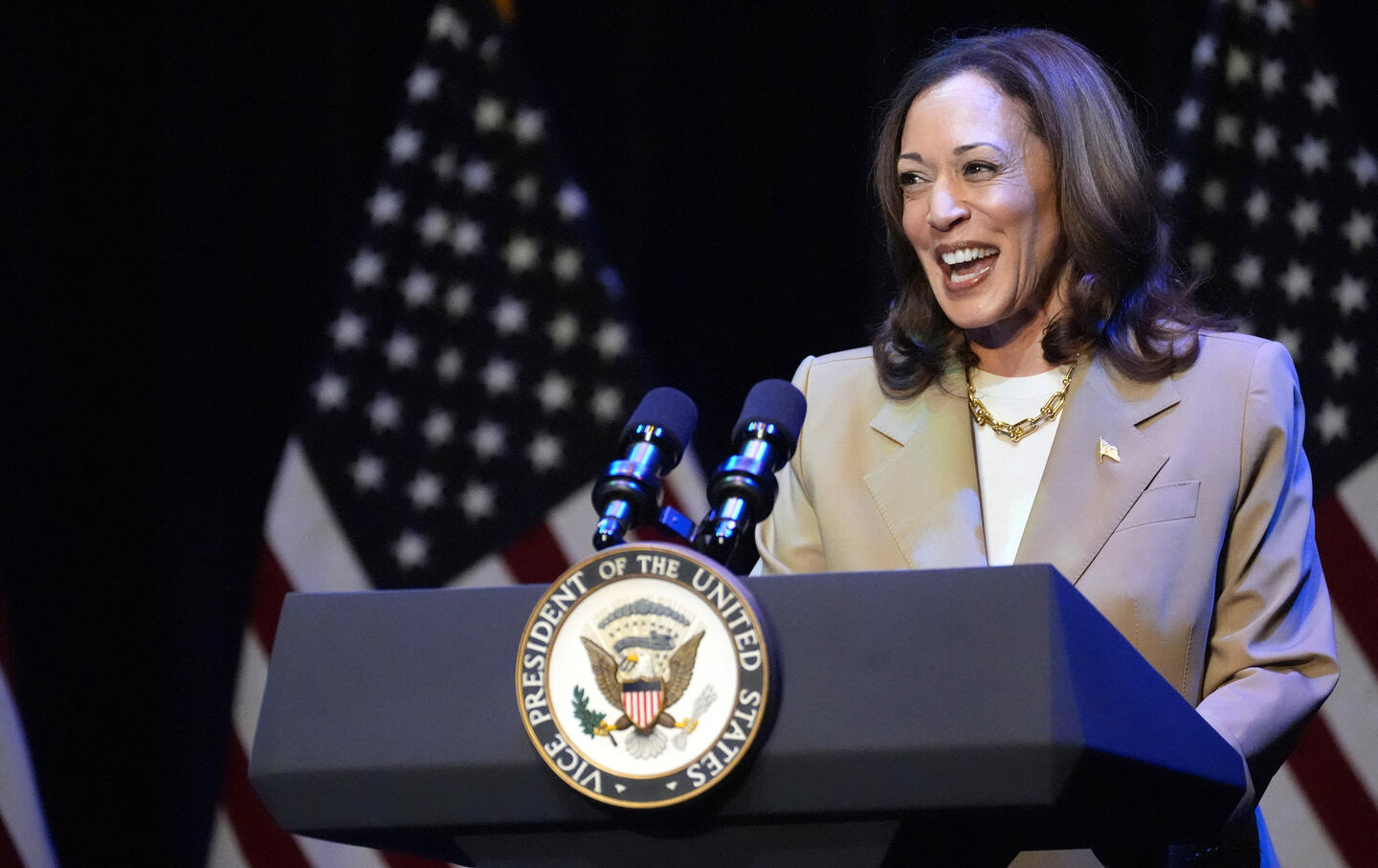
Vice President and Democratic presidential candidate Kamala Harris speaks during a campaign fundraising event in Pittsfield, Massachusetts, on July 27, 2024.
(Stephanie Scarbrough / AFP)Kamala Harris is likely to be the next president of the United States—that’s what Steve Phillips says. He’s on the podcast this week analyzing changes in the electorate and suggests what the Democrats need to do to create majorities in the swing states.
Also on this episode: Los Angeles has 4,000 homeless vets, living on the streets. Now, a class action suit demanding that the VA fulfill its pledge to provide housing for them is going to trial in federal court. The lead attorney for the homeless vets, Mark Rosenbaum, explains the arguments and the evidence.

Here's where to find podcasts from The Nation. Political talk without the boring parts, featuring the writers, activists and artists who shape the news, from a progressive perspective.
Republicans are about to end Obamcare subsidies, driving up premiums for 20 million people during the year of the midterm elections. How have they managed to end up after all these years with no health insurance plan of their own? John Nichols comments.
Also: Bob Dylan’s earliest recordings have just been released—the first is from 1956 when he was 15 years old—on the 8-CD set ‘Through the Open Window: The Bootleg Series vol. 18” – which ends in 1963, with his historic performance at Carnegie Hall. Sean Wilentz explains – he wrote the 120 page book that accompanies the release.
Our Sponsors:
* Check out Avocado Green Mattress: https://avocadogreenmattress.com
Advertising Inquiries: https://redcircle.com/brands
Privacy & Opt-Out: https://redcircle.com/privacy
Jon Wiener: From The Nation magazine, this is Start Making Sense. I’m Jon Wiener. Later in the show: Los Angeles has 4,000 homeless vets, living on the streets. Now a class action suit demanding the VA fullfill its pledge to provide housing for them is going to trial in federal court. We’ll speak with the lead attorney for the homeless vets, Mark Rosenbaum.
But first: How Kamala can win: Steve Phillips has our analysis – in a minute.
[BREAK]
How Kamala can win: for our analysis, we turn to Steve Phillips. He wrote the bestseller, Brown is the New White, How the Demographic Revolution has Created a New American Majority. He also hosts the podcast Democracy in Color, and he writes for The Guardian, The Washington Post and The Nation. A new edition of his book, How We Win the Civil War, updated for this year’s election, is out now. Steve Phillips, welcome back.
Steve Phillips: Thanks for having me. Glad to be here.
JW: Who do you think is most likely to be elected president on November 5th?
SP: I think it’s most likely that Kamala Harris will be the next president of the United States.
JW: Let’s start with the fundamentals. Every year young people turn 18 and old people die. How many?
SP: That’s a really important part people miss in these interpretations of the election, they don’t realize how much it continues to change. Biden won by 7 million votes over Trump in 2020. Since 2020, 16 million people have turned 18 and entered the electorate, and around 12 million people have died. But the Democrats did almost 30 points better among young people, and Trump won among old people, so the electorate is more favorable to Democrats in general now than it was four years ago.
JW: Nevertheless, Biden was behind in the polls this year. A July 18th poll by CBS showed Trump leading Biden 51 to 47. On that poll, Biden was backed by 42% of white voters. 42% does not sound very good.
SP: Well, in the actual history of how elections have played themselves out, it’s actually among the highest percentages that a Democratic nominee has ever gotten. Obama in ’08 got 43%. Clinton in ’96 got 43%. Obama, 2012, only got 39%. 42% among the white vote is a very actually strong showing for a Democratic nominee.
JW: Where was the falloff in Democratic votes for Biden between 2020 and his final polls this year?
SP: It’s among voters of color – that’s where the softness is. I’ve never really believed those numbers in terms of how the electorate would actually play itself out. But what everyone thinks, it’s all changed now, but clearly it was among voters of color where those numbers were much lower. Biden got 87% of the African American vote in 2020. These polls had him low 70s, something like that, a 15-point drop off, so that’s where the softness was. But people didn’t really appreciate or do a deeper dive to see exactly what was going on in terms of what made those top line numbers look like they did.
JW: We’re speaking on Tuesday, it’s July 30th, only nine days since Biden dropped out of the race and endorsed Kamala. The polls have already been transformed. The Morning Consult poll released Tuesday, July 30th, had Kamala 47, Trump 46. Wonder if you have any comment on the new Morning Consult poll.
SP: That’s what’s fascinating. It’s just really why I’m so optimistic about Harris’ showing. The polls have already shifted in those marginal ways, and yet even in those polls, the African American numbers are still quite low and that the Morning Consult had her around 70, low 70% of African American vote. I fully expect Kamala to get low to mid-90s percentage of the African American vote, very similar to what Obama did, and that’s going to bring up all of these overall numbers that people are looking at.
And this is also what you saw particularly in 2018, people didn’t fully grasp this around Stacey Abrams, particularly the primary election. It was a fairly close race a month out from that, but it had African Americans 50% undecided because they had two different Staceys and people hadn’t figured it out. But as people got clear, as the Black vote came home, Stacey won by what? 40 points or something? I fully expect the Black vote is going to be extraordinary for her and that’s going to boost her prospects in a very, very significant way.
JW: My favorite poll this week is from Fox News, conducted July 22nd to 24th, released on Sunday. Fox News, in this poll, polled Wisconsin, Pennsylvania, Michigan and Minnesota, found that Harris’ approval rating surpassed Trump’s in all of them. In Michigan, Harris was leading Trump in favorability 57 to 47.
SP: Wow.
JW: For decades, the Democrat’s problem has never been winning a majority of the voters. The problem has been winning a majority of the electoral college, which of course is biased towards Republicans, and we’ve all studied and learned that there’s this small number of swing states. The Democrats have to win Wisconsin, Michigan and Pennsylvania, the blue wall. If they win those, they win the election, and then Arizona, Nevada, Georgia, Biden also won those, he narrowly lost North Carolina. Are you confident that the demographic changes you described are characteristics of these swing states as well as the population as a whole?
SP: Yes, on a few different levels. And so, clearly in 2022, Mandela Barnes ran for Senate in Wisconsin and narrowly lost. What happened was you had a lower Black turnout in Milwaukee in the heavily Black areas. And so, there was not the turnout that – if there had been a higher Black turnout, I think it was a 20,000-vote margin, he would’ve actually won that election. High Black turnout makes a significant difference.
I mean, I don’t think anyone’s talking about putting even Ohio into play, but I remember doing the numbers back in the day that if John Kerry, when he ran in 2004, had gotten low to mid-90s Black support, he would’ve won Ohio and won the election.
JW: Wow.
SP: There’s enough Black vote in particular, as well as the other voters of color, in Michigan, Wisconsin and Pennsylvania to make a difference. More fundamentally and forward-looking is what’s happening in Georgia and Arizona, so that was not a one-off. That’s the trend that voters of color turning out in high numbers – tried to make the case or to document the case in my book about both Georgia and Arizona. What’s happened over the past decade, Arizona’s brought half a million Latinos into the electorate over the past decade, and then they won by 12,000 votes in 2020. They won by 18,000 votes for governor in 2022, so these trends are continuing to occur as the country continues to diversify, making the electorate more progressive.
JW: For the last few weeks, we’ve been following the political news, not just daily, but hourly, it seems like, at least I have, but there are tens of millions of Americans who don’t do that. For them, the presidential campaign begins after Labor Day, and these people certainly know what they think about Trump. They’ve had eight years to decide that. A lot of them don’t know much about Kamala Harris and the professionals say the task for the next four weeks is to define Kamala, define her as qualified, experienced, trustworthy. While, of course, the other side is also working to define her, we have used the term “swift-boating” for this enterprise. At this point, there’s millions of voters who don’t know much about Kamala. That certainly is going to change between now and November.
SP: I think that most people are misinterpreting modern-day politics, and they put far too much emphasis on the particular individual traits of the candidates, and they don’t appreciate the candidate’s relationship to, frankly, these movements. Whether to make this country more a multiracial democracy or to make this country, frankly, a white country. You would never, nobody of any political ilk would design a candidate who has as many flaws as Donald Trump does, and yet he continues to be very competitive. It’s not because he has these ideal components of a perfect candidate. It’s because he’s the leader of this movement to make America white again and he can do no wrong in these people’s eyes.
The countervailing force to that are those people who have been marginalized and excluded and discriminated against for centuries. And so, now in a matter of hours, on that Sunday, you have all of these people, people of color, women of color, young people feeling like, “Oh my God, we could have somebody who comes from our communities as the president and it’s within our grasp.” That’s behind all this enthusiasm that you’re seeing and that’s what’s swamping the entire election. $200 million in one week is because of this. The dam has broken of all of those constituencies who have been marginalized and they are just going to the mat for Kamala. And that’s going to be far, far more important than whatever ads the Republicans run trying to define her.
JW: I have a question about the polls. The polls usually report results for likely voters. Likely voters are defined by the pollsters primarily as people who have voted in all or most of the past several elections. And right now, polls of likely voters show pretty much a statistical tie nationwide. But what happens to the accuracy of polls of likely voters if young first-time voters vote in significant numbers?
SP: That’s what these polls are missing, is that there was very little enthusiasm for Biden. And so, even I thought that the fundamentals still favored him, but it was going to be more of a squeaker and people have to, whatever, hold their nose or whatever. But what’s going to happen now, and what you’re already seeing happening with the outpouring of financial support, enthusiasm, and volunteering, is that there’s going to be greater participation. And so, more people, more young people will vote this election than voted before.
Biden won among young people by 30 points in 2020, and Biden was an old dude. And so, when they see Kamala with all of her connection to a younger generation, that number is going to increase. And then, similarly, I think there’s going to be higher African American turnout, higher voters of colors turnout so that share of the electorate is going to be bigger and that’s going to boost the overall numbers for Harris’ ticket.
JW: My biggest worry is about what happened to Stacey Abrams, and we’ve been with Stacey for decades. After a decade of exemplary grassroots organizing work in Georgia, she did get the Reverend Raphael Warnock elected to the Senate and created a Democratic majority in the Senate, but she lost her own race for governor. Voters in Georgia elected the Black man, but not the Black woman. Why was that?
SP: That is a real reality, and that’s partly why I was cautioning that there should be prudence around this rush to dump Biden because we didn’t know. Hillary lost in 2016. Sexism was a very strong factor in that election and that the misogynoir is what came into play in Georgia. This country has never, in its entire history, ever elected a Black woman governor. That’s a long data set and you can’t say there have never been anybody qualified, that’s because that’s not the picture of leadership.
Having said all of that, it still becomes a turnout game, and as we were talking about the top, the electorate has continued to trend more in the progressive and Democrat’s favor. I had been concerned about this. The unleashing of enthusiasm that we have seen in terms of these fundraising numbers and the volunteering numbers gives me more hope. And I also feel that the culture has continued to evolve and to change around issues of greater acceptance and gravitating towards the role and place of women in leadership. You see it in the popular culture, the success of the movie Barbie, the success of Beyonce and Taylor Swift, women’s sports, Caitlin Clark in basketball. The culture is evolving in ways that I think it’s more receptive overall to now having a female president.
JW: In Georgia, which people voted for Warnock and did not vote for Stacey Abrams, do we know that?
SP: It was fundamentally white. It was white voters. Stacey and Warnock had the same percentage of the Black vote, right about 90%. 29% of whites voted for Warnock, and just 25% of whites for Stacey. And so, that was clearly the difference in that outcome, which is also what’s exciting about the Kamala piece. They’ve had all of these very organic and incredibly enthusiastic Zoom calls, starting at-
JW: Yeah. There was this White Women for Harris call last Thursday; it had more than 160,000 people. It raised more than $8 million in one night.
SP: Right. That was an example that followed off of originally on the Sunday of the selection, Jotaka Eaddy, who used to work with NAACP back in the day, she’s been a long-time leader in the political space, organized the Black women’s call. Then Roland Martin organized the Black Men’s call, and then there was Latino, Asian, and then that White Women’s call. And then, this week they had a White Dudes for Kamala call.
JW: Yeah, I wanted to ask what you thought about White Dudes for Kamala. Some of our colleagues at The Nation were not sure that was a good idea. This was Monday night. But the call ended up with, they say, 190,000 participants, including Jeff Bridges, “The Dude” from The Big Lebowski, and they raised $4 million – half as much as the women did, but still 190,000 white dudes for Kamala. Do you think that was a good idea?
SP: I think it was a great idea. What we don’t talk about enough is how much of modern-day politics, well, also old-standing politics, is driven by this really existential question, which is a racial question. Is this a multiracial country or is this going to be a primarily white country? And that’s been going on for the entirety of this country. It’s no accident that Trump followed the first Black president.
And so, this issue, the undercurrent of are we going to openly and proudly embrace this, being a multiracial democracy, is critical. I don’t think we appreciate or celebrate or encourage progressive whites to be progressive whites and to make a strong stand with people of color, and this moment and this campaign is presenting that opportunity in a very big way.
JW: Already, the independent groups that support Democrats and the Democratic candidate and party itself have hundreds of millions of dollars that they’re planning to spend a lot of it on registering those new eligible young voters and voters of color in the seven swing states. I wonder if you have any suggestions about the best way to do that or who you think are the best groups doing it?
SP: Well, that’s a critical piece and that is going to be one of the challenges, hopefully, with the campaign for one, for the campaigns themselves to fully staff up. When Obama ran in 2012, he had 1000 people on the ground in Florida. He had 1000 people in Ohio going door to door. But in each of these different states, there’s significant infrastructure.
And so, Arizona in particular, I talk about this a lot in my book, there’s coalition now working as America Votes Coalition in Arizona. Groups like LUCHA who came out of the anti-immigrant legislation struggle or have a significant voter engagement program. Worker Power in Arizona is another significant organization. And then, similarly in Georgia, there’s groups like America Votes Georgia – is a strong voter mobilization organization. Care in Action is run by the person who was one of the top deputies to Stacey Abrams, Hillary Holley. They’ve got a significant program going in Georgia. There’s significant on-the-ground capacity and expertise, and that is what people should be pouring money into because that is what’s going to push the Democrats over the finish line.
JW: Steve Phillips – his article is titled “Running Kamala Harris may actually be a political masterstroke for the Democrats” – it appeared in The Guardian, US edition. Steve, thanks for talking with us today.
SP: Thanks for having me on.
[BREAK]
Jon Wiener: Los Angeles is well known for the tens of thousands of homeless people sleeping on the streets every night. And according to the city’s official count, about 4,000 of them are veterans, many of whom have disabilities, including traumatic brain injury and PTSD. Los Angeles is also the home of a huge body of land officially dedicated to housing disabled veterans. A beautiful 400-acre gated campus in Brentwood. And yet the VA is refusing to settle a class action suit by disabled, homeless vets seeking housing there and has insisted on a trial which will begin on August 6th.
The lead attorney for the Disabled Homeless Vets in their class action suit is Mark Rosenbaum. He’s senior special counsel at the organization, Public Counsel. He’s argued landmark cases before the Supreme Court four times and more than two dozen cases before the Federal Courts of Appeal and the California State Supreme Court. A few decades ago, he also represented me in a freedom of information lawsuit for the John Lennon FBI files. He joins us now. Mark Rosenbaum, welcome back.
Mark Rosenbaum: Nice to see you again, Jon. You’re one of my favorite plaintiffs.
JW: Thank you!
What is the official policy of the VA towards providing housing for homeless vets, especially disabled vets?
MR: Well, that’s a far more complicated question, requiring a far more complicated answer than it should. The simple answer should be that the phrase “homeless veterans” should be an American oxymoron. The government has repeatedly, under administration after administration, taken the position that one of its critical missions is to end veteran homelessness. But its official position, as your introduction indicated, is to fight efforts, efforts in court, to say that these veterans have a right to permanent supportive housing, that that right has to be vindicated now, otherwise, those veterans on the streets, and LA is the homeless capital of the nation for veterans, those veterans are going to die, as has in fact been the case.
So their stated position is ‘end veteran homelessness’, and their official position in terms of what happens in practice is to prolong veteran homelessness. They’re taking the position that they cannot construct permanent supportive housing. They cannot subsidize permanent supportive housing. All they can do is outsource it, and whatever time it takes is whatever time it takes.
JW: In 2015, you, and the ACLU, won a major settlement from the VA over this case. When they agreed to provide housing for homeless vets on the LA campus in Brentwood, they agreed to provide 1,200 units. You talked about it here on this show. We all celebrated the victory. It’s now almost 10 years later, and you’re going to trial in a few weeks on pretty much the same issues. What happened to the 2015 settlement? Did it reduce the number of homeless vets in LA?
MR: The prior case was a case called Valentini. It was brought, as you said, by the ACLU and by Inner City Law Center and by a private law firm. There was a settlement. The case was brought in 2011, and initially the government fought US tooth and nail not just on the issues you’re talking about, but on a set of leases on that 388-acre land, to the UCLA baseball team, to Brentwood School, which is one of the most affluent private schools anywhere in the country, to enterprise Rent-A-Car, to Marriott Laundry. We fought all those issues. And we reached a settlement after four years, after those leases, for example, had been declared illegal. And we thought that was cause for celebration.
We made what I have said in court and what I have said publicly, an egregious error, and I take responsibility for that, in that we agreed to a non-enforceable settlement. And the result of that was that the development of permanent supportive housing languished. By 2022, the government was supposed to have 770 units of permanent supporting on that land. Instead, it had 223. For the first five years, six years of the settlement, they didn’t have a single new unit.
And so we had no choice then November of 2022 to bring a lawsuit. Even now, the government says that there will be 1,200 units — by 2030. Certainly not at the pace they’re going, but that’s what they say. But they say, “We don’t have any projections of veteran homelessness,” and that’s not going to be adequate. And we presented testimony the government doesn’t fight us on this, that veterans of Iraq, Afghanistan, Vietnam have lived and died on the streets of LA, and nothing accelerates that system. And the government is fighting us as if we were representing Osama bin Laden.
JW: Did that 2015 settlement reduce the number of homeless vets in LA?
MR: Definitely, it has put some veterans in housing, but the pace of increase of homelessness has outpaced those veterans who were in fact put in permanent supportive housing. In addition, the evidence is overwhelming that as many veterans that go into permanent supportive housing through a program called a VASH and rental units throughout the city, as many as go in, come out. And that’s for failure of the VA to have an adequate system of support services.
We’re not just seeking housing. Because when you suffer, as you pointed out, PTSD and severe mental illness and brain trauma, you need assistance in order to be able to access medical care. And the government has been woefully inadequate in terms of actually providing those support services. So have veterans been put into housing? Yes. A drop in a bucket. But has it kept up with the pace of homelessness? No. And our veterans who are put in homelessness staying there, by and large, they are not. They go out as often as they go in in terms of the housing in the community.
JW: I read that the number of homeless veterans in LA has tripled since your 2011 lawsuit. You think that’s correct?
MR: That may be conservative in terms of what’s actually taking place. When we asked the VA, the VA has seven outreach workers servicing all of LA and other catchment areas. So the VA is not identifying all the veterans who are in fact on the streets. So do I think that number is accurate? I think it’s accurate and probably conservative.
JW: This is a class action suit. Who’s in the class? Who are your lead plaintiffs?
MR: The class represents all disabled veterans in the Los Angeles community. Our class includes individuals who suffered just injuries of war that are unspeakable and they have been living on the streets for years and years. One of the veterans went over in the first group to Iraq and loaded mortars for days and now cannot stand straight up. Other individuals who are amputees, who suffer from severe PTSD, are unable to take care of their daily affairs. Individuals who serve the country unit’s time of need, and now the country has deserted them in their time of need. And these individuals have been on the street, sometimes on the street that’s adjacent to the grounds that you’re talking about. San Vicente Boulevard to those who know Los Angeles, a veteran’s row that was visible to all those who in fact were on those grounds. And they stayed there for years, even during Covid, stayed there for years without getting any sort of housing.
And the position of the government was, “We cannot build housing for them. We cannot bring them onto the grounds. We can’t even feed them.” They took the position that it was illegal to even bring food for them. And that doesn’t say anything about the encampments throughout Los Angeles. If you go to any of the encampments and they’re on every block, as you know Jon, you will find individuals who are wearing military garb.
I had one member of the VA say to me, “Well, Mark, where are these veterans?” And I thought, “You could find Osama bin Laden, but you can’t find 4,000 homeless veterans in Los Angeles?”
This is a solvable solution. But as our federal judge, Judge Carter said, it appears that the VA is more interested in a lease with Brentwood school and those Brentwood students or the UCLA baseball team than it is with actually making sure that there be housing and adequate services for our veterans.
JW: Federal Judge David O. Carter, who’s hearing the case, ruled in your favor on some of your claims in federal court recently. He granted summary judgment on part of the case. Tell us about that decision.
MR: Just to backstep one moment, he actually ruled in our favor on virtually all of our claims in saying that they were cognizable claims, that they were claims that could go forward. We brought the case under the Rehabilitation Act of federal anti-discrimination against disabled individuals law, and along the deed that the government received in 1888 to set up a soldier’s zone, which in fact functioned as a soldier’s zone with some 4,000 vets on those grounds through the Spanish-American War and World War I and World War II and the Korean War. And then the VA kicked them off during Vietnam and instead began the sort of leases we’re talking about. The government opposed our claims. The government said those claims that they owed the veterans no legal duty nor any fiduciary duty, and Judge Carter ruled in our favor.
More recently, we attacked an issue that goes to the eligibility requirements for the housing you and I have been talking about. The VA uses a system. They say, “We can’t build housing. We can’t subsidize housing. What we can do is outsource it.” So they go through this laborious, extraordinarily time-consuming process of outsourcing the development of the housing to private developers who then go to state and local entities to get financing. The financing that they have obtained has a tax credit system that by definition penalizes makes the ineligible our most disabled veterans.
JW: How can that be?
MR: The system that they utilize is one that says, “Look, we want financing.” The state and local entities say, “Well, we’ll give it to you, but only if you impose certain requirements, income requirements.” On paper that sounds kind of reasonable if-
JW: Yeah, you don’t want rich vets living in housing for poor veterans.
MR: Exactly right. However, as part of the income limitations, what the VA has done is to say, “We will agree to limitations that count disability compensation as income.” So in other words, the most disabled veterans who aren’t getting income, they’re getting compensation for the wounds of war that they suffered. That goes into the calculations. And as Judge Carter found, what that meant, that those individuals who are 100% disabled, 90% disabled don’t qualify for the housing.
So we went to court as your earlier question indicated, and we said, “You got to drop this. You are using an individual’s disability to penalize that individual so that they can actually redress the disability that they suffered in war.” And the government said, “Absolutely not.” So we went to court. I said to Judge Carter, “What they’re doing is outsourcing discrimination against the disabled.” And in the decision that you’re referencing, the judge agreed with us and struck down a system that is utilized not just in Los Angeles, but all over the country. So the hope and expectation from Judge Carter’s ruling is that this system, this absolutely irrational, cruel system, isn’t it, that system that says to our most disabled veterans, “You can’t get permanent supportive housing. You are not even eligible,” that’s going to end.
JW: There’s one thing I don’t understand here. Why does the VA bring in private developers to build this housing on government land? The way this works is, as you’ve said, the developers who are profit making companies, rely on something called tax credit financing. I’ve tried to understand tax credit financing. The federal government issues tax credits to state governments, state housing agencies award the tax credit to private developers through a competitive process, and the developers then sell the tax credit to private investors to obtain funding. It’s an idea of the Reagan era that you finance government through tax credits. But why doesn’t the federal government just build the housing we need with taxpayer dollars?
MR: Well, as long as it took you just now to explain it is a good metaphor for how long it takes to actually get the financing to begin with. And when you asked me at the beginning of our conversation what has happened, part of what has happened is that it has taken four or five years to even put a shovel in the ground because of the financing system you described. It makes no sense whatsoever. The government builds hospitals on those grounds. It builds housing for staff members on those grounds. It sits next to UCLA, which builds a baseball stadium on those grounds. It sits next to Brentwood school, which builds athletic facilities for its students on these grounds. But what the VA says is, “We can’t build it ourselves. We can’t even just subsidize it, have a general contract to just do it directly and not go through this crazy ‘finance system’.”
When I said to the government, “Why won’t you build it directly?”, their argument is, “Well, we don’t have the authorization.” And I said to them, “Well, we don’t agree with you on that,” particularly whether it’s a violation of the disability laws. And I said, “Well, have you ever gone to Congress?” The VA has a budget of in the neighborhood of $369 billion. $369 billion, and the government says, “We can’t build that housing.” I said to the government, “How much is a veteran’s life worth? How do you calculate that? What’s the cost to government to have veterans sleeping on the streets?”
The veterans I represent have better housing in Iraq and Afghanistan than they do in Los Angeles. Whatever it is, it is a violation of the compact that it has made with veterans.
You asked me of our veterans, so many of them said to me, “I didn’t sign up for this. I signed up to go fight for my country. I didn’t sign up to come back with the wounds that I have suffered mentally and physically, with the destruction to my life, my family’s life, and to live on the street.” But the government has taken an unalterable position that cannot and will not build the housing itself.
This isn’t a matter of moral values. It’s not a matter of human values. Of course, it’s that, but it’s a matter of legal requirements so that these individuals can get back as much as possible to the health that they had before they began service. And the government, through every administration, has taken the position that it cannot and will not build the housing itself. If it did, they’d have it done in a moment’s time.
JW: You said every administration has held the same position. So you’re currently being brought to trial by the Biden administration, resisting a settlement, demanding a trial before a judge, which is going to begin on August 6th. Why is the Biden administration fighting you on this? Have you figured that out?
MR: And opposing the legal right of veterans to have supportive housing themselves. It’s a great question because every president, including President Biden, has taken the position that their mission is to end veteran homelessness. And as I said earlier, they are prolonging it. The only rationale I can come to is one of two things. Either they don’t want to do it in Los Angeles because it would mean that they would have to do it throughout the country, God forbid. Or it’s because their commitment to veterans is something that looks good on paper, but in reality, they don’t hold.
JW: Mark Rosenbaum of Public Counsel. He’s the lead attorney in a class action suit demanding the VA provide housing in LA for homeless disabled vets. The case goes to trial in federal court on August 6th. Mark, thanks for all your work – and thanks for talking with us today.
MR: It’s always great to talk with you, Jon.
Subscribe to The Nation to Support all of our podcasts
Disobey authoritarians, support The Nation
Over the past year you’ve read Nation writers like Elie Mystal, Kaveh Akbar, John Nichols, Joan Walsh, Bryce Covert, Dave Zirin, Jeet Heer, Michael T. Klare, Katha Pollitt, Amy Littlefield, Gregg Gonsalves, and Sasha Abramsky take on the Trump family’s corruption, set the record straight about Robert F. Kennedy Jr.’s catastrophic Make America Healthy Again movement, survey the fallout and human cost of the DOGE wrecking ball, anticipate the Supreme Court’s dangerous antidemocratic rulings, and amplify successful tactics of resistance on the streets and in Congress.
We publish these stories because when members of our communities are being abducted, household debt is climbing, and AI data centers are causing water and electricity shortages, we have a duty as journalists to do all we can to inform the public.
In 2026, our aim is to do more than ever before—but we need your support to make that happen.
Through December 31, a generous donor will match all donations up to $75,000. That means that your contribution will be doubled, dollar for dollar. If we hit the full match, we’ll be starting 2026 with $150,000 to invest in the stories that impact real people’s lives—the kinds of stories that billionaire-owned, corporate-backed outlets aren’t covering.
With your support, our team will publish major stories that the president and his allies won’t want you to read. We’ll cover the emerging military-tech industrial complex and matters of war, peace, and surveillance, as well as the affordability crisis, hunger, housing, healthcare, the environment, attacks on reproductive rights, and much more. At the same time, we’ll imagine alternatives to Trumpian rule and uplift efforts to create a better world, here and now.
While your gift has twice the impact, I’m asking you to support The Nation with a donation today. You’ll empower the journalists, editors, and fact-checkers best equipped to hold this authoritarian administration to account.
I hope you won’t miss this moment—donate to The Nation today.
Onward,
Katrina vanden Heuvel
Editor and publisher, The Nation


